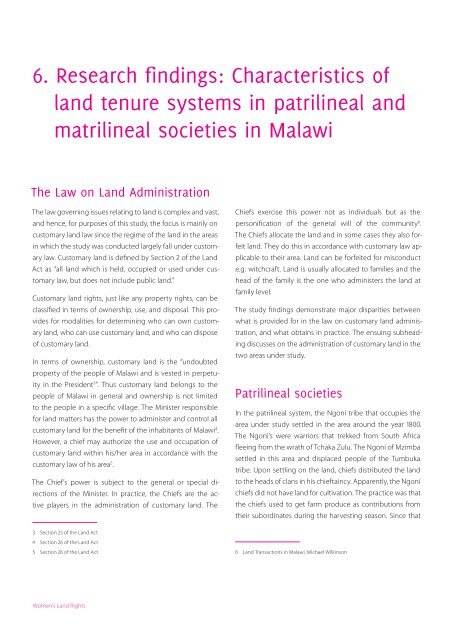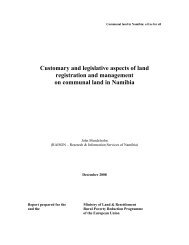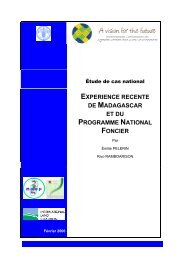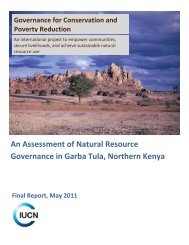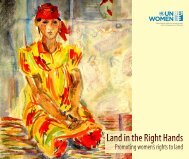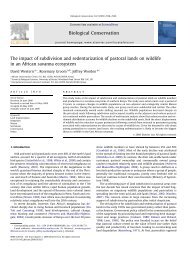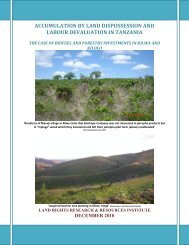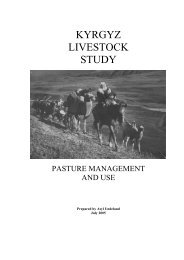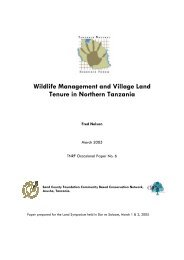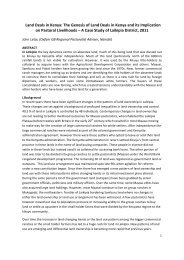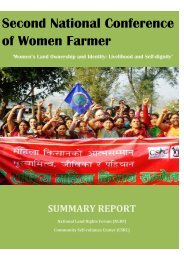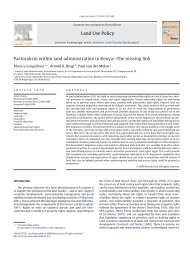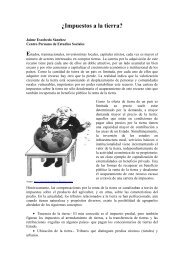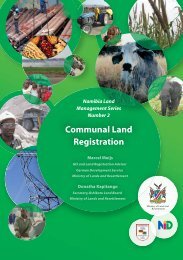Women's access to land and household bargaining power
Women's access to land and household bargaining power
Women's access to land and household bargaining power
Create successful ePaper yourself
Turn your PDF publications into a flip-book with our unique Google optimized e-Paper software.
6. Research findings: Characteristics of<br />
<strong>l<strong>and</strong></strong> tenure systems in patrilineal <strong>and</strong><br />
matrilineal societies in Malawi<br />
The Law on L<strong>and</strong> Administration<br />
The law governing issues relating <strong>to</strong> <strong>l<strong>and</strong></strong> is complex <strong>and</strong> vast,<br />
<strong>and</strong> hence, for purposes of this study, the focus is mainly on<br />
cus<strong>to</strong>mary <strong>l<strong>and</strong></strong> law since the regime of the <strong>l<strong>and</strong></strong> in the areas<br />
in which the study was conducted largely fall under cus<strong>to</strong>m-<br />
ary law. Cus<strong>to</strong>mary <strong>l<strong>and</strong></strong> is defined by Section 2 of the L<strong>and</strong><br />
Act as “all <strong>l<strong>and</strong></strong> which is held, occupied or used under cus-<br />
<strong>to</strong>mary law, but does not include public <strong>l<strong>and</strong></strong>.”<br />
Cus<strong>to</strong>mary <strong>l<strong>and</strong></strong> rights, just like any property rights, can be<br />
classified in terms of ownership, use, <strong>and</strong> disposal. This pro-<br />
vides for modalities for determining who can own cus<strong>to</strong>m-<br />
ary <strong>l<strong>and</strong></strong>, who can use cus<strong>to</strong>mary <strong>l<strong>and</strong></strong>, <strong>and</strong> who can dispose<br />
of cus<strong>to</strong>mary <strong>l<strong>and</strong></strong>.<br />
In terms of ownership, cus<strong>to</strong>mary <strong>l<strong>and</strong></strong> is the “undoubted<br />
property of the people of Malawi <strong>and</strong> is vested in perpetuity<br />
in the President3 ”. Thus cus<strong>to</strong>mary <strong>l<strong>and</strong></strong> belongs <strong>to</strong> the<br />
people of Malawi in general <strong>and</strong> ownership is not limited<br />
<strong>to</strong> the people in a specific village. The Minister responsible<br />
for <strong>l<strong>and</strong></strong> matters has the <strong>power</strong> <strong>to</strong> administer <strong>and</strong> control all<br />
cus<strong>to</strong>mary <strong>l<strong>and</strong></strong> for the benefit of the inhabitants of Malawi4 .<br />
However, a chief may authorize the use <strong>and</strong> occupation of<br />
cus<strong>to</strong>mary <strong>l<strong>and</strong></strong> within his/her area in accordance with the<br />
cus<strong>to</strong>mary law of his area5 .<br />
The Chief’s <strong>power</strong> is subject <strong>to</strong> the general or special directions<br />
of the Minister. In practice, the Chiefs are the active<br />
players in the administration of cus<strong>to</strong>mary <strong>l<strong>and</strong></strong>. The<br />
3 Section 25 of the L<strong>and</strong> Act<br />
4 Section 26 of the L<strong>and</strong> Act<br />
5 Section 26 of the L<strong>and</strong> Act<br />
Women’s L<strong>and</strong> Rights<br />
Chiefs exercise this <strong>power</strong> not as individuals but as the<br />
personification of the general will of the community6 .<br />
The Chiefs allocate the <strong>l<strong>and</strong></strong> <strong>and</strong> in some cases they also forfeit<br />
<strong>l<strong>and</strong></strong>. They do this in accordance with cus<strong>to</strong>mary law applicable<br />
<strong>to</strong> their area. L<strong>and</strong> can be forfeited for misconduct<br />
e.g. witchcraft. L<strong>and</strong> is usually allocated <strong>to</strong> families <strong>and</strong> the<br />
head of the family is the one who administers the <strong>l<strong>and</strong></strong> at<br />
family level.<br />
The study findings demonstrate major disparities between<br />
what is provided for in the law on cus<strong>to</strong>mary <strong>l<strong>and</strong></strong> administration,<br />
<strong>and</strong> what obtains in practice. The ensuing subheading<br />
discusses on the administration of cus<strong>to</strong>mary <strong>l<strong>and</strong></strong> in the<br />
two areas under study.<br />
Patrilineal societies<br />
In the patrilineal system, the Ngoni tribe that occupies the<br />
area under study settled in the area around the year 1800.<br />
The Ngoni’s were warriors that trekked from South Africa<br />
fleeing from the wrath of Tchaka Zulu. The Ngoni of Mzimba<br />
settled in this area <strong>and</strong> displaced people of the Tumbuka<br />
tribe. Upon settling on the <strong>l<strong>and</strong></strong>, chiefs distributed the <strong>l<strong>and</strong></strong><br />
<strong>to</strong> the heads of clans in his chieftaincy. Apparently, the Ngoni<br />
chiefs did not have <strong>l<strong>and</strong></strong> for cultivation. The practice was that<br />
the chiefs used <strong>to</strong> get farm produce as contributions from<br />
their subordinates during the harvesting season. Since that<br />
6 L<strong>and</strong> Transactions in Malawi, Michael Wilkinson


